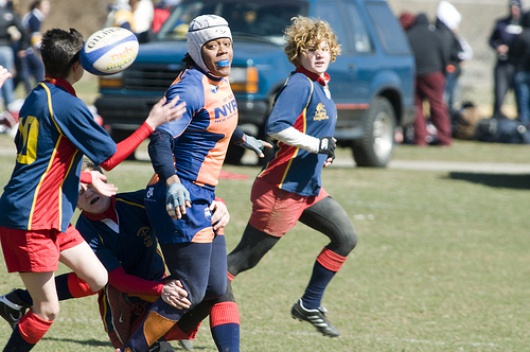
Rugby: an equal opportunity sport?
Published on
Translation by:
 francesca reinhardt
francesca reinhardt
‘Rugby is a wonderful show: dance, opera and, suddenly, the blood of a killing,’ actor Richard Burton once said. Ordered chaos, rule-ridden – or rather ‘laws’, according to the jargon – but also with tackles, scrums, and ferocious tries, rugby is savagery bound in an iron-clad ethic
There is certainly a fair bit of violence involved. The English writer P. G. Wodehouse wrote in 1930 that ‘the main scheme is to work the ball down the field somehow and deposit it over the line at the other end and that, in order to squalch this programme, each side is allowed to put in a certain amount of assault and battery and do things to its fellow man which, if done elsewhere, would result in 14 days without the option, coupled with some strong remarks from the Bench.’
'A beastly game played by gentlemen'
But is it really just pure violence? Anything but; the concept of 'fair play' and non-violence are the hallmarks of any self-respecting rugby player: no high tackles, no tackling anyone without the ball, no tripping people, as well as great respect for the referee and for the defeated adversary. These values are indeed the very making of the lions on the pitch. As Sergi Blàsquez, president of the Catalan rugby league association, puts it: 'Rugby is a noble sport. It’s a mistake to think it’s violent just because it’s a contact sport. On the contrary, it is based on discipline and dedication, and above all, on enormous respect for team-mates and opponents.'
For Georgi Dzhangyryan, president of the Ukrainian national rugby federation, players should aspire above all to 'courage and sportsmanship'. From Stockholm, Christ Sigworth, development manager of the Swedish rugby union, echoes the same view. 'Rugby is based on respect. Respect for the other team and for the referee. It’s a hard game, but it’s clean.' It is not by chance that one of the most famous traditions is the so-called 'third half': after the match, the opposing teams celebrate together, as do their respective fans. Needless to add, the fans do not need to be segregated in the stands.
Football with hands
 In short, the old saying holds true: rugby is a hooligan’s sport played by gentleman. Moreover, in England it is a product of the public schools (i.e. private schools,) teeming with the future ruling classes. Legend would have it that it was invented in 1823 by William Webb Ellis, pupil at the English boarding school Rugby, which now has a monument to commemorate his deed. Until then, the rules of football provided that you could touch but the ball with your hands, but not pick it up and run, which is just what Ellis did during a match with his schoolmates. In 1841, Rugby School accepted this practice into its regulations, which was just the start of rugby’s success. The sport caught on worldwide, spreading to the New World and even Europe. In 1908 it was declared an Olympic sport.
In short, the old saying holds true: rugby is a hooligan’s sport played by gentleman. Moreover, in England it is a product of the public schools (i.e. private schools,) teeming with the future ruling classes. Legend would have it that it was invented in 1823 by William Webb Ellis, pupil at the English boarding school Rugby, which now has a monument to commemorate his deed. Until then, the rules of football provided that you could touch but the ball with your hands, but not pick it up and run, which is just what Ellis did during a match with his schoolmates. In 1841, Rugby School accepted this practice into its regulations, which was just the start of rugby’s success. The sport caught on worldwide, spreading to the New World and even Europe. In 1908 it was declared an Olympic sport.
A solution to the battle of the sexes?
In Anglo-Saxon countries, rugby became the natural complement to an upper-class education. This is the essence of the educational perspective espoused by the Italian rugby league federation; with its charter of values, rugby is like a 'school of life'. Marty Davis, coach for the Luxembourg rugby federation, shares this view. 'Rugby makes you work together and puts kids at ease with many different roles and physical types. Consider that everyone has to play attack and defence; girls gain confidence because they have to master both things, and boys become more tolerant and learn to appreciate the different skills of their team-mates. It is really a team sport.' Who knew - a solution to the battle of the sexes?
Translated from Il rugby, uno sport per le pari opportunità?


